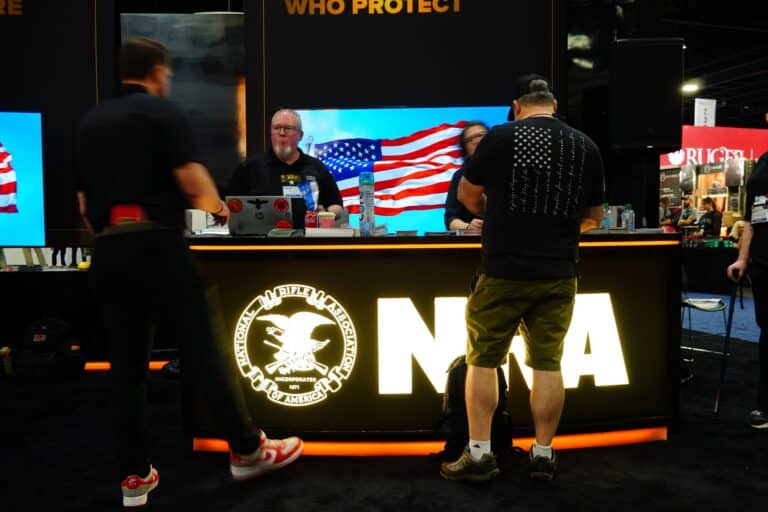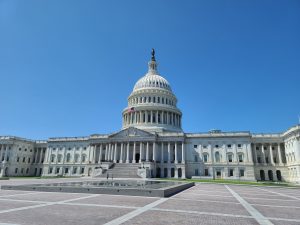The former head of the National Rifle Association and longtime powerhouse Florida lobbyist is accusing a leading gun-control group of trying to buy her off.
Marion Hammer, the first female president of the NRA, said in a lawsuit filed in federal court this month that Brady United offered her millions of dollars. She claimed taking the money would require her to cut ties with the NRA and stop lobbying on behalf of gun interests.
“In 2018, Plaintiff was contacted by an attorney representing the Brady gun control group,” Richard Coates, Hammer’s lawyer, wrote in the suit. “The group offered five million dollars ($5,000,000) to Plaintiff if she would retire and cease advancing the interests of the NRA and defending the Second Amendment.”
The surprising claim may shed light on the political atmosphere during the turbulent post-Parkland push that resulted in substantial new gun restrictions in Florida. It may also go even further in revealing how deep the rift between the NRA and one of its former presidents and top state lobbyists has become.
That’s because the claim about Brady comes in Hammer’s lawsuit against the NRA.
The 85-year-old Hammer spent more than half her life as a lobbyist for the gun-rights group. She was a fierce ally of longtime CEO Wayne LaPierre, but gained a strong reputation of her own. While she served as NRA President in the mid-1990s, Hammer gained prominence primarily through her work in Florida–where she helped usher in a series of gun law reforms that made owning and carrying the weapons easier.
Hammer was a key player in creating the legal structure that saw Florida earn the “Gunshine State” moniker, as evidenced by either side of the debate’s reaction to her 2022 retirement. Republican Wilton Simpson, who was the Senate President at the time, described her as “standing in the breach against left-wing extremists who want to take our guns.” Shannon Watts, Moms Demand Action founder, said Hammer had “been a driving force to weaken Florida’s gun laws for decades, working to pass deadly policies and then conspiring with the NRA to extrapolate worst practices to other states.”
The Gunshine era didn’t last forever, though. In the wake of the 2018 Parkland school shooting, where a gunman killed 17 people, Hammer and the NRA’s influence within the state’s Republican-controlled government wasn’t strong enough to stop a raft of new gun restrictions from making it into law. The legislature passed, and then-Governor Rick Scott (R.) signed, new Extreme Risk Protection Orders and restrictions on gun buying by those under 21.
It was around that period when Hammer claims Brady offered her a huge payday to quit her gun-rights advocacy. In her lawsuit, she said she reported the offer to LaPierre, and he followed up with a sort of counteroffer.
“Mr. LaPierre informed Plaintiff that he, along with NRA Treasurer Woody Phillips and NRA Chief of Staff Josh Powell, had developed a proposal that would assure Plaintiff’s continued involvement in the NRA through a consulting arrangement, while funding a retirement for her future,” the lawsuit reads. “Although the new proposal would pay less than half the offer from the Brady group, the proposal would allow Plaintiff to continue working with the NRA for years to come.”
Hammer’s lawsuit framed the deal as a retirement contract, where she would continue to advise the NRA instead of taking up “other opportunities.”
“Under this new proposal, Plaintiff’s Contract would be extended for an additional ten (10) years and she could continue consulting on important Second Amendment issues nationally, putting her in a position to ultimately retire from the national scene,” the suit reads. “Most importantly, however, the NRA would continue to control Plaintiff’s ‘other engagements’ and assure itself that Plaintiff would never be aligned with the opposition. Plaintiff reasonably relied upon these representations and decided to forego her other opportunities, while remaining on the side of the NRA.”
While the NRA would reach its membership peak that year, the gun-rights group’s biggest scandal also began to come to light. LaPierre, Phillips, and Powell–the three men Hammer said created her deal–were all found liable by a New York jury for the misappropriation of millions in NRA funds. LaPierre, in particular, was accused of using NRA funds on lavish personal expenses, such as private flights and fancy suits.
Hammer remained a LaPierre supporter through the years-long ordeal. She also continued to be one of the only NRA board members to collect hundreds of thousands from the group during that period. However, after LaPierre resigned in the weeks before the jury’s findings, Hammer opposed a succession plan favored by other LaPierre-backers. Andrew Arulanandam, who briefly served as interim CEO after LaPierre’s resignation, then terminated Hammer’s contract without explanation.
“Although Plaintiff had fully and substantially performed the terms of her Contract, no explanation was given for the NRA’s actions,” the suit reads. “Since the date of the telephone call, the NRA has withheld lawfully due payments to Ms. Hammer, leaving her with only social security as income.”
Hammer claims the termination is an unlawful breach of contract. She further claims the NRA has continued to use her likeness to promote its work and that the group misapplied a donation she made to the group’s 501(c)(3) fondation by instead sending it to its 501(c)(4), which deprived her of the tax benefits to donating to the former. She is seeking the unpaid contract amount, interest, legal fees, and other damages from the US District Court for the Northern District of Florida.
Neither Brady nor the NRA responded to requests for comment about the allegations. Hammer referred questions to her lawyer, who didn’t respond to a request for evidence of the offer.
However, others have responded to Hammer’s claims. The Citizens Committee for the Right to Keep and Bear Arms, a separate gun-rights group, said the accusation warranted investigation from the Internal Revenue Service. The group argued the alleged offer could violate Brady’s non-profit mission.
“This is not the kind of offer a tax exempt organization should be making under any circumstances,” Alan Gottlieb, the group’s chairman, said in a statement. “First and foremost, nobody’s First Amendment rights should ever be for sale, and secondly, the nature of this allegation almost appears as though the gun control group was offering Mrs. Hammer a bribe to walk away from an issue to which she had dedicated most of her adult life.”
While the windup of the New York corruption trial and its relationship with outside law firm Brewer Attorneys presents the NRA with an opportunity to slash legal costs as well as move on from its scandal, it still has to deal with a number of lingering lawsuits. In addition to Hammer’s claims, the group faces suits from a class-action of former donors and Oliver North, another former NRA president.






